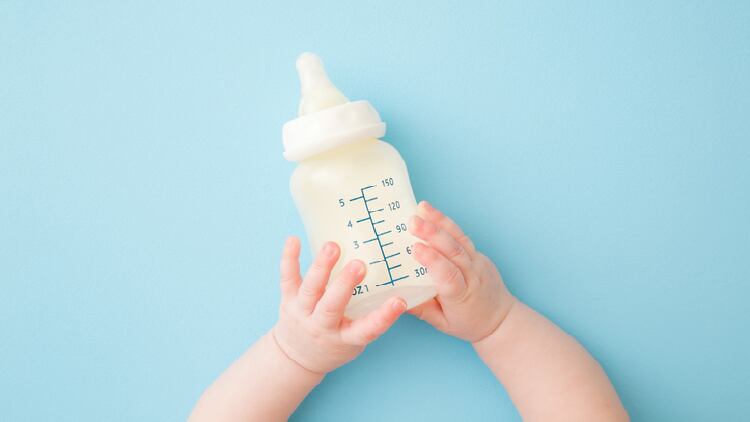The aim of this study was to compare length, weight and head circumference as well as gastrointestinal (GI) symptoms over 17 weeks between the Aptamil Essensis PHP group with another group fed a prebiotic formula (Aptamil Pronutra). A breastfed group was also included in this study which acted as a reference.
Daily weight gain, infant growth and GI tolerance were similar between Aptamil Essensis PHP and Aptamil Pronutra as well as the breastfed group, suggesting Aptamil Essensis PHP’s suitability for use in healthy term infants.
“Research has shown baby formulas with a specific blend of synbiotics (combination of probiotics and prebiotics) can contribute to a gut microbiota that is closer to that of healthy breast-fed babies increasing the presence of good bacteria in the baby’s gut. In early life, synbiotics can play a key role in the development of a baby’s digestive system and immune system,” said Gregg Ward, Head of Science, Healthcare and Medical Affairs Danone China.
Ward explained: “At Danone, we know breast milk offers a child the best nutritional start in life. It’s nature’s most powerful nutrition and tailormade for a baby’s needs. That’s also why we aim to achieve a combination of nutrients for the composition of our formulas that is inspired by the quantity, diversity and functionality of components in breast milk.”
Aptamil Essensis PHP is a partially hydrolysed non-ultra-filtrated cow's milk containing a synbiotic mixture of 0.8 g/100 ml galacto-oligosaccharides and long-chain fructooligosaccharides (scGOS/lcFOS; 9:1 ratio) and Bifidobacterium breve M-16V (3 × 107 CFU/g).
Aptamil Pronutra is a cow's milk protein based infant formula containing a prebiotic mixture of 0.8 g/100 ml scGOS/lcFOS (9:1 ratio).
“The study published in Nutrition is the first trial conducted in China to investigate whether a baby formula with partially hydrolysed protein and synbiotics is tolerated by and supports healthy growth of Chinese babies compared to a baby formula with intact protein and prebiotic fibres (galacto-oligosaccharides and long-chain fructooligosaccharides),” Ward told NutraIngredients-Asia.
Study design
In this prospective, randomised, double-blind, controlled trial, healthy Chinese infants below 45 days old were recruited across four cities including Shanghai, Beijing, Guangzhou and Wuxi.
They were split into the test formula (n=112; Aptamil Essensis PHP) and control formula (n=112; Aptamil Pronutra) groups. 60 breastfed infants were also enrolled as a reference.
All infants were of healthy birth weight and normal head circumference at enrolment.
There were 5 visits in total, comprising baseline, week 4, 8, 13 and 17.
Infant were weighed and measured for head circumference and length at each visit.
Before each visit except baseline, parents completed a 7-day paper diary on infant formula intake, GI symptoms like stool consistency and frequency as well as regurgitation and vomiting.
Both infant formulas were provided in identical 800g tins.
The mean daily infant formula intake at week 4 was 806 mL and 803 mL for the test and control groups respectively.
At week 17, this increased to 961 mL and 975 mL for the test and control groups respectively.
Growth outcomes
Weight, length and head circumference gain was similar between both infant formula groups as well as the breastfed reference group.
The mean daily weight gain was 32g/d, 32.4g/d and 31.9g/d for the test, control and breastfed groups respectively.
The mean daily length gain was 1.18mm/d, 1.19mm/d, and 1.09mm/d for the test, control and breastfed groups respectively.
For head circumference, the mean daily gain was 0.55mm/d, 0.54mm/d and 0.54mm/d for the test, control and breastfed groups respectively.
GI symptoms
In terms of GI symptoms, average stool frequency was 1.9 stools per day at week 4, and dropped to 1.0 at week 17 among both infant formula groups.
In the breastfed reference group, the stool frequency was 4.3 and 1.6 stools per day at week 4 and 17 respectively.
The percentage of watery stools among infant formula-fed infants was very low, while the breastfed group reported higher frequency of watery stools. Previous studies have documented that breastfed infants have softer stools than infant formula-fed infants.
Hard stools were rarely reported during the intervention period among all infants. Previous studies have reported the stool softening effect of scGOS/lcFOS and B. breve M-16V, due to the bifidogenic effect of these prebiotics and probiotics.
The occurrence of any or frequent regurgitation or vomiting were similar between the infant formula infants and breastfed reference groups at all timepoints.
These findings suggest that infants fed Aptamil Essensis PHP show good growth and tolerance similar to that of Chinese breastfed babies, as well as those fed a prebiotic formula.
“Chinese parents are very knowledgeable and whilst there are many baby formulas in China with prebiotic and/or probiotics, the Aptamil Essensis PHP range with synbiotics is the first baby formula with this specific synbiotic blend of scGOS/lcFOS and Bifidobacterium breve M-16V,” Ward said.
Limitations and future studies
While this study is the first to evaluate this synbiotic combination and its effects on growth and GI symptoms in infants, there were also several limitations.
Some parts of the study were conducted during the COVID-19 pandemic, so about 1.3% of infant anthropometrics were being taken by parents at home, potentially affecting the accuracy of these measurements.
In addition, “It is possible that due to the pandemic, the usual environment of infants was affected, for example with reduced exposure to external environments due to a lockdown situation. However, it is anticipated that this has not substantially affected the key outcomes of this study,” researchers acknowledged.
A follow-up of these infants at 12 months of age will evaluate the intervention effects on longer-term outcomes.
This current study is the first randomised clinical trial the Danone Open Science Research Center for Life-Transforming Nutrition in China conducted with leading Chinese pediatric experts.
Aptamil Essensis PHP milk formula is available in Hong Kong and Mainland China via e-commerce sites.
Source: Nutrition
https://doi.org/10.1016/j.nut.2021.111472
“A partially hydrolyzed formula with synbiotics supports adequate growth and is well tolerated in healthy, Chinese term infants: A double-blind, randomized controlled trial”
Authors: Ying Wang, et al.





